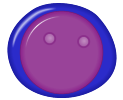Lymphoblast
Lymphoblast[edit | edit source]
A lymphoblast is a type of white blood cell that is an immature precursor to a mature lymphocyte. Lymphoblasts are primarily found in the bone marrow and are an essential part of the body's immune system. They play a crucial role in the development of the adaptive immune response.
Development[edit | edit source]
Lymphoblasts originate from hematopoietic stem cells in the bone marrow. These stem cells differentiate into common lymphoid progenitor cells, which then further differentiate into lymphoblasts. Lymphoblasts can develop into either B cells, T cells, or natural killer cells, depending on the signals they receive during their maturation process.
During their development, lymphoblasts undergo a series of changes, including the rearrangement of their immunoglobulin or T-cell receptor genes, which is crucial for the diversity and specificity of the immune response.
Function[edit | edit source]
The primary function of lymphoblasts is to proliferate and differentiate into mature lymphocytes. This process is essential for the maintenance of the immune system and for the body's ability to respond to antigens. Once they have matured, lymphocytes can circulate in the blood and lymphatic system, where they perform various immune functions.
Clinical Significance[edit | edit source]
Lymphoblasts are of particular interest in the study of leukemia, especially acute lymphoblastic leukemia (ALL). In ALL, there is an overproduction of lymphoblasts, which can crowd out normal cells in the bone marrow and lead to a variety of symptoms, including anemia, infection, and bleeding disorders.
The identification and study of lymphoblasts are crucial for the diagnosis and treatment of ALL. Techniques such as flow cytometry and immunophenotyping are used to analyze the characteristics of lymphoblasts in patients suspected of having leukemia.
Laboratory Identification[edit | edit source]
In the laboratory, lymphoblasts can be identified by their large size, high nuclear-to-cytoplasmic ratio, and the presence of nucleoli within the nucleus. They can be distinguished from mature lymphocytes by these morphological characteristics.
Staining techniques, such as Wright's stain or Giemsa stain, are commonly used to visualize lymphoblasts under a microscope. These stains help highlight the cellular features that are characteristic of lymphoblasts.
Related Pages[edit | edit source]
Search WikiMD
Ad.Tired of being Overweight? Try W8MD's physician weight loss program.
Semaglutide (Ozempic / Wegovy and Tirzepatide (Mounjaro / Zepbound) available.
Advertise on WikiMD
|
WikiMD's Wellness Encyclopedia |
| Let Food Be Thy Medicine Medicine Thy Food - Hippocrates |
Translate this page: - East Asian
中文,
日本,
한국어,
South Asian
हिन्दी,
தமிழ்,
తెలుగు,
Urdu,
ಕನ್ನಡ,
Southeast Asian
Indonesian,
Vietnamese,
Thai,
မြန်မာဘာသာ,
বাংলা
European
español,
Deutsch,
français,
Greek,
português do Brasil,
polski,
română,
русский,
Nederlands,
norsk,
svenska,
suomi,
Italian
Middle Eastern & African
عربى,
Turkish,
Persian,
Hebrew,
Afrikaans,
isiZulu,
Kiswahili,
Other
Bulgarian,
Hungarian,
Czech,
Swedish,
മലയാളം,
मराठी,
ਪੰਜਾਬੀ,
ગુજરાતી,
Portuguese,
Ukrainian
Medical Disclaimer: WikiMD is not a substitute for professional medical advice. The information on WikiMD is provided as an information resource only, may be incorrect, outdated or misleading, and is not to be used or relied on for any diagnostic or treatment purposes. Please consult your health care provider before making any healthcare decisions or for guidance about a specific medical condition. WikiMD expressly disclaims responsibility, and shall have no liability, for any damages, loss, injury, or liability whatsoever suffered as a result of your reliance on the information contained in this site. By visiting this site you agree to the foregoing terms and conditions, which may from time to time be changed or supplemented by WikiMD. If you do not agree to the foregoing terms and conditions, you should not enter or use this site. See full disclaimer.
Credits:Most images are courtesy of Wikimedia commons, and templates, categories Wikipedia, licensed under CC BY SA or similar.
Contributors: Prab R. Tumpati, MD

